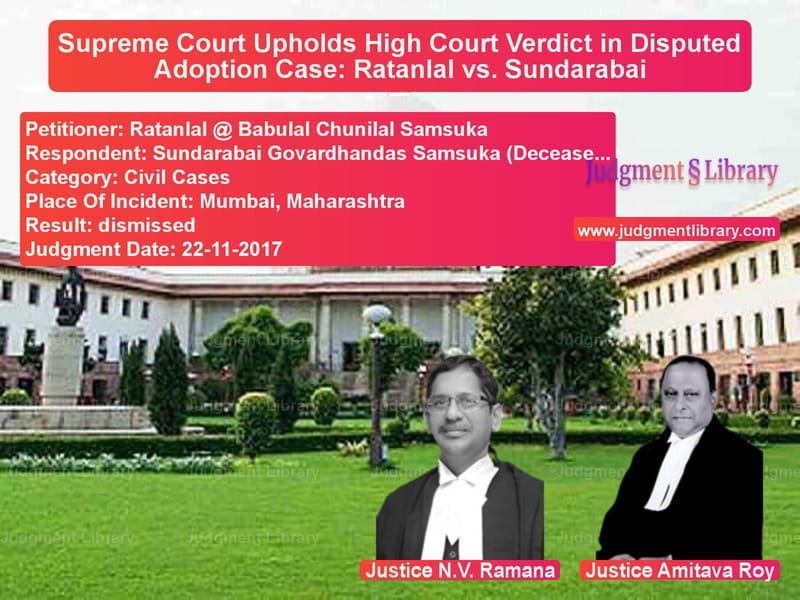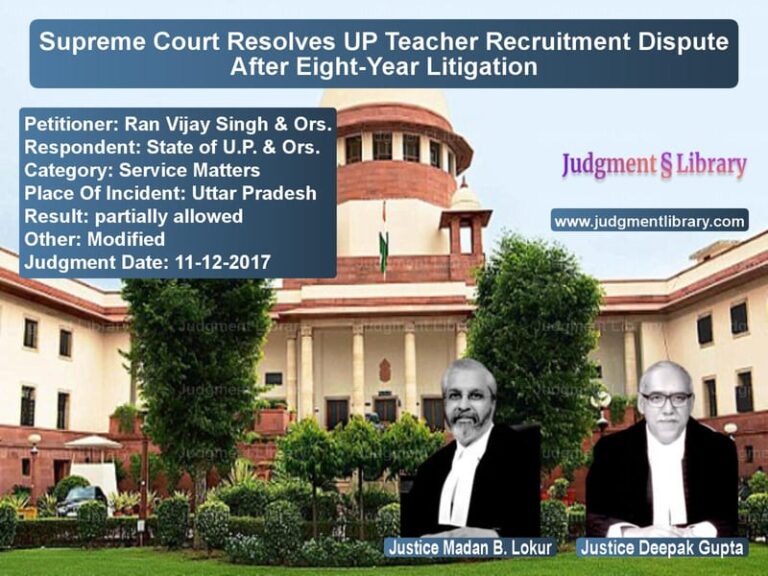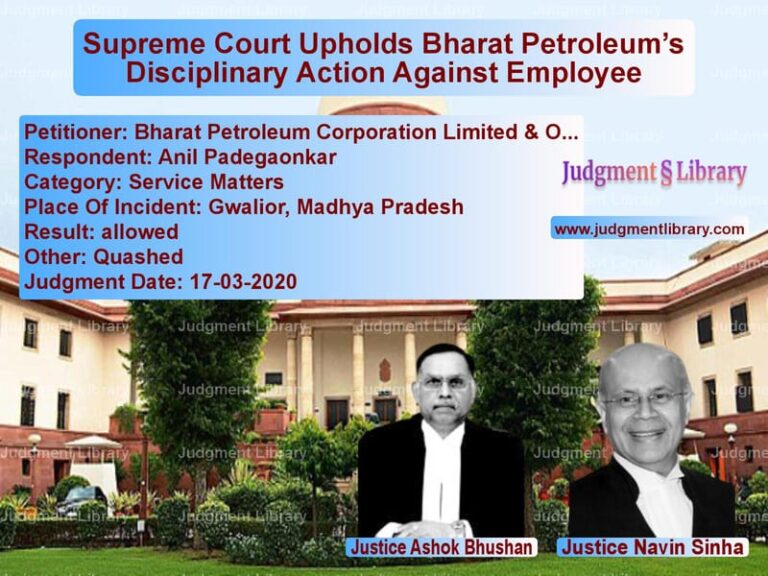Supreme Court Upholds High Court Verdict in Disputed Adoption Case: Ratanlal vs. Sundarabai
The Supreme Court of India, in the case of Ratanlal @ Babulal Chunilal Samsuka v. Sundarabai Govardhandas Samsuka (Deceased) & Ors., delivered a landmark judgment affirming the High Court’s decision that the appellant was not the adopted son of Late Govardhandas Laxmichand Samsuka. The judgment clarifies the evidentiary burden required to establish adoption under Hindu law and emphasizes the importance of proving customary practices with strong documentary evidence.
Background of the Case
The dispute revolved around the inheritance of Late Govardhandas Laxmichand Samsuka, who was survived by his wife, Sundarabai, and his extended family. The appellant, Ratanlal @ Babulal Chunilal Samsuka, claimed to be the adopted son of Govardhandas and, therefore, entitled to inheritance rights.
Sundarabai, however, contested this claim and filed Special Civil Suit No. 395/1987 seeking a declaration that the appellant was not the adopted son and to establish her share in the assets of a partnership firm in which she was a partner.
The trial court ruled in favor of the appellant, rejecting Sundarabai’s claim that Ratanlal was not adopted. However, upon appeal, the Bombay High Court overturned this ruling, concluding that the adoption claim was surrounded by suspicious circumstances. This led to the present appeal before the Supreme Court.
Key Legal Issues Before the Supreme Court
- Whether the appellant, Ratanlal, had validly been adopted by Late Govardhandas under Hindu law.
- Whether the appellant provided sufficient proof to establish the existence of a custom in the Jain community permitting the adoption of a married man.
- Whether the High Court erred in rejecting the trial court’s findings regarding the validity of the adoption.
Arguments by the Appellant
The appellant, Ratanlal, argued that:
- His adoption took place in 1973 and was performed in accordance with Jain customs.
- The adoption ceremony was conducted by a priest, and evidence in the form of oral testimonies and photographs supported his claim.
- Customary law in the Jain community allows the adoption of a married man.
- Several witnesses testified that they attended the adoption ceremony.
- His name was changed in various documents, including property records, indicating recognition of his adoptive status.
Arguments by the Respondents
The respondents, legal heirs of Late Sundarabai, argued that:
- The appellant failed to prove any established custom in the Jain community permitting the adoption of a married man.
- There was no documentary evidence supporting the appellant’s claim that his name was changed in official records.
- The adoption claim was raised only after Govardhandas’ death, casting doubt on its legitimacy.
- The adoption was never mentioned in tax returns, municipal records, or any official documents.
- The appellant continued to use his biological father’s name even after the alleged adoption.
Supreme Court’s Observations
The Supreme Court, while analyzing the case, emphasized the importance of proving adoption under Hindu law:
- Section 10 of the Hindu Adoptions and Maintenance Act, 1956, states that a married person cannot be adopted unless there is a recognized custom permitting it.
- The burden of proving such a custom lies upon the party asserting it.
- The appellant failed to provide consistent and conclusive evidence of the alleged custom.
- The adoption ceremony lacked corroborative documentary proof, such as registration, municipal records, or affidavits.
- The presence of contradictions in witness testimonies regarding the adoption ceremony further weakened the appellant’s case.
The Court remarked:
“Customary adoption must be supported by clear and consistent proof. A mere assertion of custom cannot override statutory provisions unless backed by historical evidence.”
Findings on Suspicious Circumstances
The Supreme Court noted several suspicious circumstances:
- The adoption ceremony was allegedly performed a day before the marriage of Govardhandas’ daughter, which was an unusual timing.
- Photographs produced by the appellant did not conclusively prove the adoption ceremony.
- The alleged priest who conducted the ceremony could not provide concrete details about the event.
- The appellant continued using his biological father’s name in financial and legal documents even after 1973.
- The High Court had rightly pointed out these inconsistencies, warranting rejection of the adoption claim.
Final Judgment
The Supreme Court upheld the High Court’s findings, ruling that:
- The appellant failed to establish that he was legally adopted.
- There was no valid proof of a prevailing custom permitting the adoption of a married man in the Jain community.
- The appeal was dismissed, and the High Court’s ruling was affirmed.
Impact of the Judgment
The Supreme Court’s ruling reinforces several important legal principles:
- Customary practices must be backed by strong and credible evidence.
- Burden of proof in adoption cases is high due to its implications on inheritance rights.
- Courts must be cautious in accepting oral testimonies when documentary evidence is lacking.
- Judicial scrutiny of adoption claims is essential to prevent fraudulent claims over inheritance.
Conclusion
The Supreme Court’s ruling in Ratanlal @ Babulal Chunilal Samsuka v. Sundarabai Govardhandas Samsuka sets a precedent for rigorous scrutiny of adoption claims. It reinforces the principle that claims of adoption must be substantiated by strong and convincing evidence, particularly when they impact inheritance rights. This judgment ensures that statutory laws prevail over unverified customary claims, safeguarding the legal framework governing family and succession matters.
Don’t miss out on the full details! Download the complete judgment in PDF format below and gain valuable insights instantly!
Download Judgment: Ratanlal @ Babulal C vs Sundarabai Govardhan Supreme Court of India Judgment Dated 22-11-2017.pdf
Direct Downlaod Judgment: Direct downlaod this Judgment
See all petitions in Succession and Wills
See all petitions in Property Disputes
See all petitions in Specific Performance
See all petitions in Judgment by N.V. Ramana
See all petitions in Judgment by Amitava Roy
See all petitions in dismissed
See all petitions in supreme court of India judgments November 2017
See all petitions in 2017 judgments
See all posts in Civil Cases Category
See all allowed petitions in Civil Cases Category
See all Dismissed petitions in Civil Cases Category
See all partially allowed petitions in Civil Cases Category







